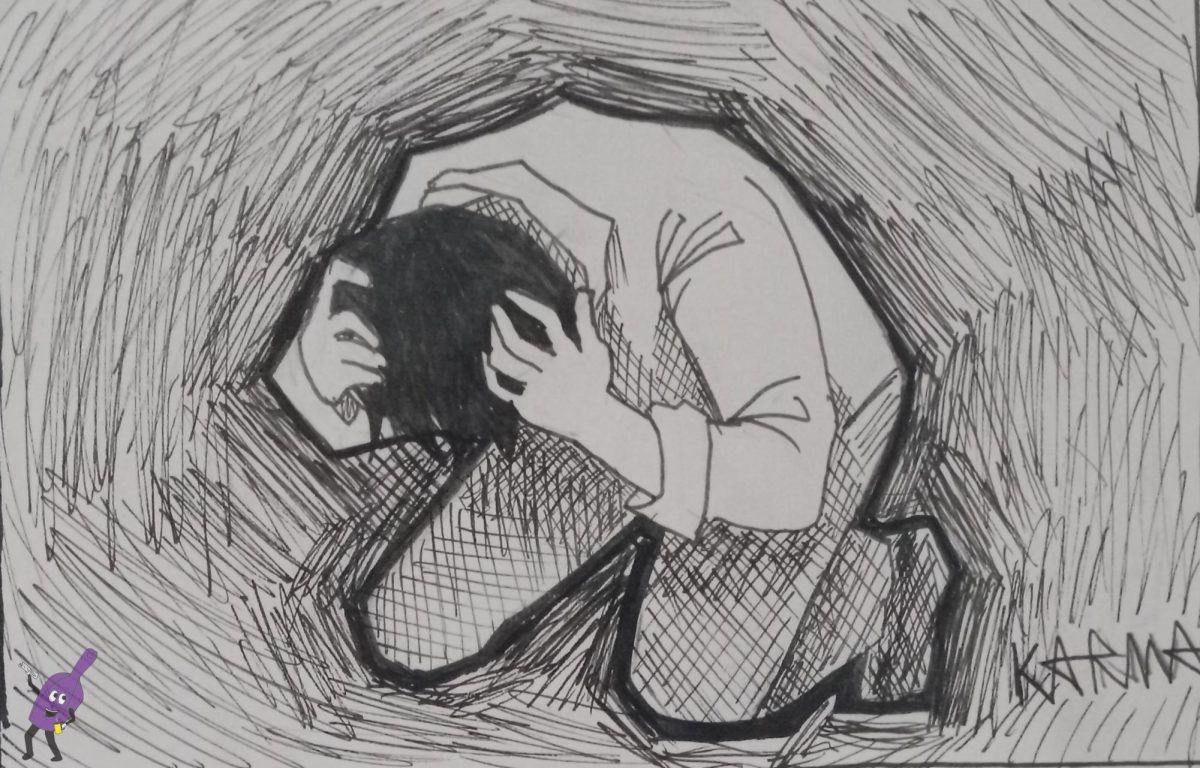The second edition of an exploration into the different ways teens cope with the struggles of anxiety.
Clutching a paper coffee cup and artisanal cookie for dear life, Sentinel Student Two* (S.S.T) stands slightly swaying, tired but happy to be here. The rain dribbles down just a foot from the alcove S.S.T. stands under, with a cool breeze blowing through.
Sentinel Student Two says that their experience with anxiety is like everything feeling more difficult than it needs to be. It’s as if they are “…[going] to explode and crawl out of their skin.” Overall, they don’t have a positive association with the emotion.
S.S.T. notes that they have struggled with anxiety issues since middle school, around the time they turned twelve. They emphasize that a bullying situation as well as struggles with ADHD also complicated their middle school experience. S.S.T. explained there was a lack of support or cooperation from teachers to aid with these things and it overall made school harder.
In addition, Sentinel Student Two’s father also struggles with similar issues, “Everything has kind of pushed me in that direction and [genetics wise] my dad has anxiety…so it was [bound] to happen.”
For S.S.T., the coping mechanisms they use to get through the day can change a lot. “I try to not think about anything and that doesn’t quite work…[However] I do like to journal…It’s like having a little friend and telling them [everything]…and it’s great.” They also take what S.S.T called aggressive deep breaths, they demonstrated this with the intake of a sizable amount of air and then a furious, dragon-like, exhale.
With their anxiety often following them throughout the day, the most influential thing Sentinel Student Two finds themselves doing is distracting themselves. Sometimes that can look like screaming in their car for a minute, or chilling out and listening to music they like.
S.S.T doesn’t necessarily feel unique in their coping mechanisms, they think they follow a pretty predictable pattern. “I’m sure there’s things that work for me and don’t for other people and [vice versa] but overall I think I do the standard [routine].” That said, what they do does feel like it helps them manage, as S.S.T. states it keeps them from crying and freaking out in the middle of the day, and that’s what matters. If a coping skill can keep them from destructive behaviors such as picking at their hands, then it is effective enough for Sentinel Student Two.
They have also learned new ways of coping from other people, one particular skill they found worth noting was throwing some cold water on their face in moments of panic. This was recommended by their therapist, but S.S.T. playfully gloats that they did this before it was suggested. Really what Sentinel Student Two does to learn new directions for coping is take bits and pieces of what others do, they suggest trying this method.
S.S.T. also encourages others to do all of the things that sound cliche but really are tried and true. So even though taking deep breaths might seem “stupid, lame, or dumb…[they] are helpful and might make you feel good.” They also propose you try to find the little joys in life.
When Sentinel Student Two struggles to get up in the morning and go to math class, they remind themselves that they have other classes to look forward to. They think of all of the fun they will have in future activities and use that to motivate them up and out the door. “You just kind of trick your brain.”
A large number of these coping strategies are signs of growth for S.S.T., while they used to talk to the wall a lot during the height of the COVID-19 pandemic they now journal. Instead of sitting miserable with a stomach ache, Sentinel Student Two takes a walk or readjusts their mood. “I still feel anxious, but now I just wiggle my legs and take deep breaths.” This is to say that these skills can be achieved by anyone.
S.S.T. also noted that although anyone is able to achieve a coping status, the world might not be so accommodating in helping them on that journey. They feel that often in society they are expected to conform and that others don’t have the patience for those with anxiety issues.
“I don’t think the world was built for…anxious people, but I think we have to make due. You just have to take it from the world and say ‘I’m gonna take my deep breaths if I want to and you’re not going to stop me.’” Sentinel Student Two also explained that although it may seem like a loss to fight for comfort in the world, enough losses can be used to turn into a win. Because when “you take two Ls and put them together, they become a W.”
When asked if there were any positive sides to having high anxiety could name a few upsides. “I am much more prepared in [most] situations compared to other people.” While their anxiety may not be used to fight off saber tooth tigers like it was thousands of years ago, the preparedness that comes with it often comes in handy. S.S.T feels ready to tackle hard situations because they have already thought of the possible outcome. This means they are a capable problem solver, a trait many look for in others when a stressful situation arises.
However, thinking of every little detail of an event can be draining, and one can only write so much in their journal. Sentinel Student Two says that ideally their anxiety would disappear one day and life would suddenly be stress free. Since that outcome seems unlikely, S.S.T. would settle for being able to function a little easier through their day, something they are actively working on. With small steps of positive thinking and personal reflection the hope is that someday they will be taking just a few less deep breaths.
*For the comfort and safety of those interviewed all subjects of this series will remain anonymous.





